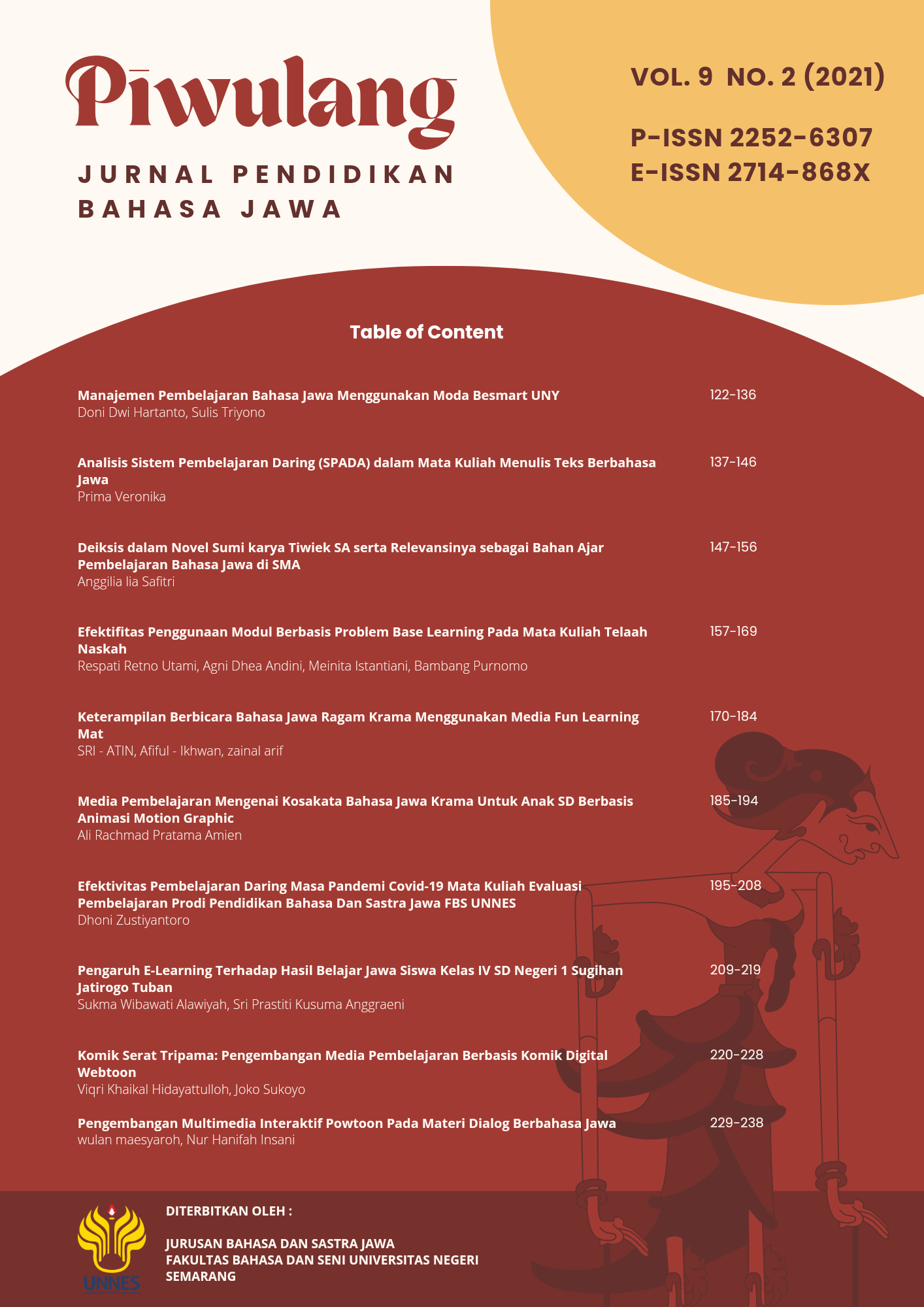Analisis Sistem Pembelajaran Daring (SPADA) dalam Mata Kuliah Menulis Teks Berbahasa Jawa
##plugins.themes.academic_pro.article.main##
Abstract
This study aims to analyze the Online Learning System (SPADA) in the Javanese Text Writing course. This type of research is a qualitative descriptive study using interpretive methods presented in the form of a description. The research subjects were students of the Java Language Education Study Program (PBJ) FKIP UNS semester II or the 2020 batch of 74 people. The sample was taken using a purposive sampling technique which only focused on students who were taking the MTBJ course in the even semester of 2021. The data collection technique used a questionnaire or questionnaire technique. The analysis technique used is data collection, data processing and giving conclusions. Data processing is presented in the form of a brief description or detailed narrative text. The data that has been obtained are categorized and then conclusions are drawn. The results showed that students got various conveniences and benefits, such as ease of remembering lecture history, improvement of IT skills, ease of sending assignments, ease of understanding theory and improving skills as well as increasing the effectiveness of the lecture process. The SPADA features or menus that are much favored by students while attending MTBJ lectures, which can increase the effectiveness of lectures are discussion forums, assignments, course materials, and my dashboard. Some improvements that must be made by SPADA are related to upgrading the system, added features, and lecturer skills improvement.
##plugins.themes.academic_pro.article.details##
References
Alqudah, N. M., Jammal, H. M., Saleh, O., Khader, Y., Obeidat, N., & Alqudah, J. (2020). Perception and experience of academic Jordanian ophthalmologists with E-Learning for undergraduate course during the COVID-19 pandemic. Annals of Medicine and Surgery, 59(September), 44–47. https://doi.org/10.1016/j.amsu.2020.09.014
Argaheni, N. B. (2020). Sistematik Review: Dampak Perkuliahan Daring Saat Pandemi COVID-19 Terhadap Mahasiswa Indonesia. PLACENTUM: Jurnal Ilmiah Kesehatan Dan Aplikasinya, 8(2), 99. https://doi.org/10.20961/placentum.v8i2.43008
Arikunto, S. (2006). Metodelogi Penelitian. Bina Aksara.
Ellis, Robert & Jarkey, Nerida & Mahony, Mary & Peat, Mary & Sheely, S. (2007). Managing quality improvement of eLearning in a large, campus-based university. Quality Assurance in Education., 15(1), 9–23. http://dx.doi.org/10.1108/09684880710723007
Elyas, A. H. (2018). Penggunaan model pembelajaran e-learning dalam meningkatkan kualitas pembelajaran. Jurnal Warta, 56(04), 1–11. http://jurnal.dharmawangsa.ac.id/index.php/juwarta/article/view/4
Hapsari, T. P. R. N., & Fitria, A. S. (2020). Efektivitas Pembelajaran Daring Mata Kuliah Evaluasi Pengajaran Bahasa Dan Sastra Indonesia Masa Pandemi Covid-19. Jurnal Ilmiah SEMANTIKA, 2(01), 11–20. https://doi.org/10.46772/semantika.v2i01.259
Hasan, N., & Bao, Y. (2020). Impact of “e-Learning crack-up” perception on psychological distress among college students during COVID-19 pandemic: A mediating role of “fear of academic year loss.” Children and Youth Services Review, 118(July), 105355. https://doi.org/10.1016/j.childyouth.2020.105355
Iswatiningsih, D., Fauzan, Dluhayati, & Lestari, Y. K. (2020). Efektivitas Pembelajaran Bahasa Indonesia Daring di Masa Pandemi COVID-19 Dalam Meningkatkan Kemampuan Berbahasa Siswa SMP. Jurnal Pendidikan, Kebahasaan Dan Kesustraan Indonesia, 5, 141–156. http://www.jurnal.unma.ac.id/index.php/dl/article/view/2853/2161
Kemdikbud. (2020). Kepmendikbud Nomor 719/P/2020 tentang Pedoman Pelaksanaan Kurikulum pada Satuan Pendidikan dalam Kondisi Khusus. Www.Kemdikbud.Go.Id, 022651, 9. https://www.kemdikbud.go.id/main/blog/2020/08/kemendikbud-terbitkan-kurikulum-darurat-pada-satuan-pendidikan-dalam-kondisi-khusus
Kumalasari, V. V. (2020). Efektivitas Pembelajaran Daring Bahasa Jawa Menggunakan Google Kelas dan Quizizz Pada Siswa SMP Negeri 1 Kayen. Piwulang : Jurnal Pendidikan Bahasa Jawa, 8(2), 164–175. https://doi.org/10.15294/piwulang.v8i2.42488
Lilis, A., Ulfah, S. I., & Endang, D. R. (2020). The Effectiveness of Using E-Learning as Learning Media. JKBM (Jurnal Konsep Bisnis Dan Manajemen), 7(November), 72–81. https://doi.org/10.31289/jkbm.v7i1.4333
Miles, M. B., & Huberman, M. A. (2014). An analytic approach for discovery. In CEUR Workshop Proceedings (Vol. 1304, pp. 89–92).
Sadikin, A., & Hamidah, A. (2020). Pembelajaran Daring di Tengah Wabah Covid-19. Biodik, 6(2), 109–119. https://doi.org/10.22437/bio.v6i2.9759
Seliana, N., Suroso, A. I., & Yuliati, L. N. (2020). Analisis Keberhasilan Penerapan E-Learning di Fakultas Teknik Universitas Riau. Jurnal Aplikasi Bisnis Dan Manajemen, 6(2), 369–378. https://doi.org/10.17358/jabm.6.2.369
Suci, M. P. (2020). Efektivitas Pembelajaran Berbasis Daring Pada Mata Kuliah Insya’ Di Stai Ma’Arif Sarolangun. Pendidikan Bahasa Dan Sastra Arab, 1(2), 59–68.
Sugiyono. (2011). Metodologi Penelitian Kuantitatif Kualitatif dan R&D. Alpabeta.
Sukendro, S., Habibi, A., Khaeruddin, K., Indrayana, B., Syahruddin, S., Makadada, F. A., & Hakim, H. (2020). Using an extended Technology Acceptance Model to understand students’ use of e-learning during Covid-19: Indonesian sport science education context. Heliyon, 6(11), e05410. https://doi.org/10.1016/j.heliyon.2020.e05410
Wida, S. (2020). Respon Mahasiswa Pada Mata Kuliah Daring. Child Education Journal, 2(1), 48–52. https://doi.org/10.33086/cej.v2i1.1506
Zhafira, N. H., Ertika, Y., & Chairiyaton. (2020). Persepsi Mahasiswa Terhadap Perkuliahan Daring Sebagai Sarana Pembelajaran Selama Masa Karantina Covid-19. Jurnal Bisnis Dan Kajian Strategi Manajemen, 4, 37–45.
